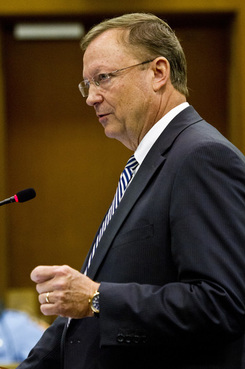Georgia Justices: City Owes No Duty to Injured Child Admitted Free to Stadium
The majority opinion said that, even though the girls child's parents paid to see the football game, the fact that she got in free means Garden City is shielded from liability for her injuries under Georgia's Recreational Property Act.
January 30, 2018 at 02:55 PM
4 minute read

The Georgia Supreme Court declared that a law shielding property owners from liability if they invite the public in free of charge means Garden City may not be sued on behalf of a girl injured at a municipal stadium because she paid no admission, even though her parents each paid $2 to see a football game.
Overturning the trial court and Georgia Court of Appeals in a 7-2 decision, the majority opinion authored by Justice Harold Melton said the plain language of the Recreational Property Act means a landowner is only liable to those who paid for entry.
There is nothing to suggest that the Legislature intended “to leave in place the potential liability of landowners to persons who have not paid to use an owner's property for recreational purposes just because the landowner would be potentially liable for others who have paid to use the property,” Melton wrote.
A dissent penned Justice Carol Hunstein and joined by Robert Benham said the majority turned established precedent on its head by basing liability on whether a particular individual paid to enter, instead of whether the general public was obliged to pay.
The ruling “effectively overturns well-settled law without explanation,” Hunstein wrote.
As detailed in appellate rulings, the case began in 2012 when Willie and Kristy Harris took their daughter Riley and two siblings to a youth football game at the Garden City Stadium. The fee was $2 per adult and $1 for students; children 6 and under got in free. Riley and he sister were both 6, so admission was not charged for them.
The children left their upper-bleacher seats during the game to go to the concession stand. Riley slipped through the bleachers and fell nearly 30 feet to the ground, suffering serious injuries on her way back.
The Harrises sued Garden City in Chatham County, asserting claims for premises liability, negligence and negligence per se. The city moved for summary judgment arguing, among other things, that it was shielded by the RPA.
The 1965 act states that “an owner of land owes no duty of care to keep the premises safe for entry or use by others for recreational purposes or to give any warning of a dangerous condition” except in cases where “the owner of land charges the person or persons who enter or go one the land for the recreational use thereof.”
Chatham County State Court Judge Hermann Coolidge Jr. denied the city's motion but granted immediate appellate review.
In November 2016, the Georgia Court of Appeals upheld Coolidge. An opinion authored by Judge John Ellington with the concurrence of Judges Elizabeth Branch and Amanda Mercier said that “notwithstanding that the city chose not to charge very young children, including Riley, to enter the facility, the stadium was not open to the public without charge.”
In reversing the lower courts, Melton wrote that the act's language shielding “a landowner 'who either directly or indirectly invites or permits without charge any person'” onto the property “specifically and unambiguously” exempts a landlord from liability anyone admitted without charge.
In a footnote, Melton took issue with Hunstein's claim that the majority overruled prior decisions. In the cases cited in the dissent, “not a single one … involves a scenario where some members of the public were charged to use a landowner's property for recreational purposes but others were not,” Melton wrote.
“[T]o adopt the position of the dissent would require us to rewrite the RPA to insert additional language about how many members of the 'general public' must be charged a fee before a landowner would no longer enjoy immunity from liability with respect to someone injured on the property who used the land for recreational purposes but was not charged a fee,” he said.
Garden City is represented by Patrick O'Connor, James Gerard and David Mullins of Oliver Maner in Savannah.
O'Connor, who argued the case at the high court, said the majority opinion “took a straightforward approach to statutory construction and looked to the plain language of the RPA to decide the case. That's what we argued the court should do.”
The Harrises' attorney, Christopher Britt of Savannah's Karsman, McKenzie & Hart, did not respond to a request for comment.
This content has been archived. It is available through our partners, LexisNexis® and Bloomberg Law.
To view this content, please continue to their sites.
Not a Lexis Subscriber?
Subscribe Now
Not a Bloomberg Law Subscriber?
Subscribe Now
NOT FOR REPRINT
© 2025 ALM Global, LLC, All Rights Reserved. Request academic re-use from www.copyright.com. All other uses, submit a request to [email protected]. For more information visit Asset & Logo Licensing.
You Might Like
View All


Sanctions Order Over Toyota's Failure to Provide English Translations of Documents Vacated by Appeals Court
4 minute readTrending Stories
Who Got The Work
J. Brugh Lower of Gibbons has entered an appearance for industrial equipment supplier Devco Corporation in a pending trademark infringement lawsuit. The suit, accusing the defendant of selling knock-off Graco products, was filed Dec. 18 in New Jersey District Court by Rivkin Radler on behalf of Graco Inc. and Graco Minnesota. The case, assigned to U.S. District Judge Zahid N. Quraishi, is 3:24-cv-11294, Graco Inc. et al v. Devco Corporation.
Who Got The Work
Rebecca Maller-Stein and Kent A. Yalowitz of Arnold & Porter Kaye Scholer have entered their appearances for Hanaco Venture Capital and its executives, Lior Prosor and David Frankel, in a pending securities lawsuit. The action, filed on Dec. 24 in New York Southern District Court by Zell, Aron & Co. on behalf of Goldeneye Advisors, accuses the defendants of negligently and fraudulently managing the plaintiff's $1 million investment. The case, assigned to U.S. District Judge Vernon S. Broderick, is 1:24-cv-09918, Goldeneye Advisors, LLC v. Hanaco Venture Capital, Ltd. et al.
Who Got The Work
Attorneys from A&O Shearman has stepped in as defense counsel for Toronto-Dominion Bank and other defendants in a pending securities class action. The suit, filed Dec. 11 in New York Southern District Court by Bleichmar Fonti & Auld, accuses the defendants of concealing the bank's 'pervasive' deficiencies in regards to its compliance with the Bank Secrecy Act and the quality of its anti-money laundering controls. The case, assigned to U.S. District Judge Arun Subramanian, is 1:24-cv-09445, Gonzalez v. The Toronto-Dominion Bank et al.
Who Got The Work
Crown Castle International, a Pennsylvania company providing shared communications infrastructure, has turned to Luke D. Wolf of Gordon Rees Scully Mansukhani to fend off a pending breach-of-contract lawsuit. The court action, filed Nov. 25 in Michigan Eastern District Court by Hooper Hathaway PC on behalf of The Town Residences LLC, accuses Crown Castle of failing to transfer approximately $30,000 in utility payments from T-Mobile in breach of a roof-top lease and assignment agreement. The case, assigned to U.S. District Judge Susan K. Declercq, is 2:24-cv-13131, The Town Residences LLC v. T-Mobile US, Inc. et al.
Who Got The Work
Wilfred P. Coronato and Daniel M. Schwartz of McCarter & English have stepped in as defense counsel to Electrolux Home Products Inc. in a pending product liability lawsuit. The court action, filed Nov. 26 in New York Eastern District Court by Poulos Lopiccolo PC and Nagel Rice LLP on behalf of David Stern, alleges that the defendant's refrigerators’ drawers and shelving repeatedly break and fall apart within months after purchase. The case, assigned to U.S. District Judge Joan M. Azrack, is 2:24-cv-08204, Stern v. Electrolux Home Products, Inc.
Featured Firms
Law Offices of Gary Martin Hays & Associates, P.C.
(470) 294-1674
Law Offices of Mark E. Salomone
(857) 444-6468
Smith & Hassler
(713) 739-1250







